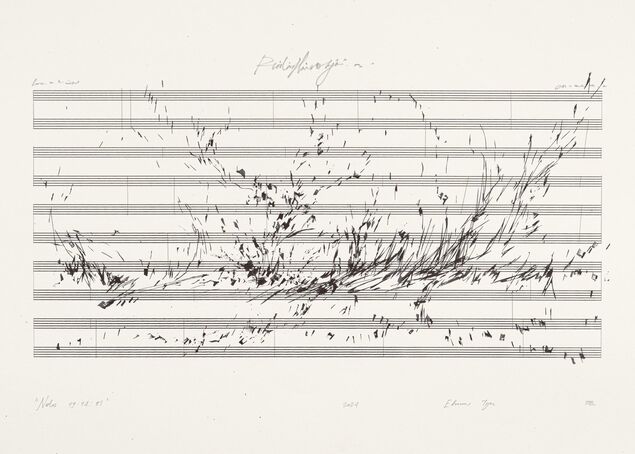Richard Strauss’s melodrama for narrator and piano performed by Viktor Ryzhakov and Sergei Kasprov.
Enoch Arden. Richard Strauss, Viktor Ryzhakov, Sergey Kasprov
- Date:
- 22 Feb 2025,
20:00–21:30
- Age restrictions
- 12+
Programme
Richard Strauss (1864–1949)
Enoch Arden, Op. 38, TrV. 181 (1897)
Melodrama for narrator and piano on a German version of Alfred Tennyson’s poem, in a Russian translation by Gustav Shpet (1935)
Richard Strauss emerged as one of the chief figures of European music at the end of the nineteenth century, primarily as a composer of orchestral works. The symphonic tone poems that he wrote at the time—Don Juan (1888), Death and Transfiguration (1889), Till Eulenspiegel (1895), and Also sprach Zarathustra (1896)—were a creative laboratory where the composer sought the optimum balance between twists of narrative and the laws of musical form. This experimentation bore marvellous fruit in the 1900s, when Strauss made his triumphant entry onto the operatic stage with Salome (1905) and Elektra (1909), works that defined the vector of development of modernist musical drama in the twentieth century.
Performed by
Viktor Ryzhakov narrator
Sergei Kasprov piano
Dmitry Volkostrelov director

Illustration: Evgenia Tut
The melodrama for narrator and piano, Enoch Arden, written by the 32-year-old Strauss in February 1897, was another important step in the composer’s progress toward opera. Its inspiration was a poem of the same name by the English author, Alfred, Lord Tennyson (1809–1892), telling the story of a sailor who suffers shipwreck, survives, but only returns home ten years later, when his two eldest children have grown up, his youngest child has died, and his wife has married a wealthy rival. Strauss was not alone among twentieth-century art reformers in being drawn towards Tennyson’s poem. The founding father of modern cinema, David Griffith (1875–1948) adapted Tennyson’s poem for the screen twice, in After Many Years (1908) and again in Enoch Arden (1911).
In Enoch Arden, Strauss scaled up the reading of poetic miniatures to piano accompaniment, a genre that had been popular with Romantic composers, creating an epic musical-theatre form where narrator and pianist are equal participants in a duet. As in his symphonic poems of the 1890s, the composer proves himself to be an heir to Richard Wagner: the hour-long score is built around a system of leitmotifs, concise and apt musical evocations of characters and situations.
Although popular when it was written, this unusual piece from the Straussian opus was neglected in subsequent years until it was rediscovered in 1962 by Canadian pianist Glenn Gould and actor Claude Rains. After their recording was released, Enoch Arden entered the repertoire of many distinguished singers and actors, from Dietrich Fischer-Dieskau to Bruno Ganz. At
Viktor Ryzhakov (b. 1960, Khabarovsk) is a theatre director. He graduated from the Far Eastern Institute of Arts and the Shchukin Theatre School and completed postgraduate studies at the Russian Institute of Theatre Arts (GITIS). In 1995–2001, he was artistic director of the Kamchatka Drama and Comedy Theatre. Since 2001, Ryzhakov has been a Professor at the Moscow Arts Theatre School. In 2012–2020, he led the Vsevolod Meyerhold Theatre and Cultural Centre, and in 2020–2022 he was artistic director of the Moscow Sovremennik Theatre. He was a prize winner at the Golden Mask and the Stanislavsky International Awards in Moscow.
Sergei Kasprov (b. 1979, Moscow) is a pianist, harpsichordist, and organist. He studied historical performance on keyboard instruments at the Moscow Conservatory under Alexei Lyubimov and organ under Alexei Parshin. Kasprov completed postgraduate studies as a pianist, also at the Moscow Conservatory, and trained at Schola Cantorum in Paris under Igor Lazko. In 2005–2007, he was awarded a special prize at the International Competition for Young Pianists in Memory of Vladimir Horowitz in Geneva, the Grand Prix at the Maria Yudina International Competition for Young Pianists in Moscow, and the first prize at the Rubinstein and Scriabin competitions in Paris. He is a regular participant of piano festivals in Europe and Russia, including La Roque-d’Anthéron (France), Klarafestival (Belgium), Chopin and His Europe (Poland), Arts Square (Saint Petersburg), December Evenings, and Antiquarium (Moscow).
Dmitry Volkostrelov (b. 1982, Moscow) is a theatre director. He is a graduate of the Russian State Institute of Performing Arts in Saint Petersburg where he studied under Lev Dodin. He set up and led the independent Post Theatre (Saint Petersburg), was artistic director of the Vsevolod Meyerhold Centre in Moscow (2020–2022) i and was among members of the Jubilee Year Group at the Taganka Theatre (2013–2014), also in Moscow. He has directed productions at the Theatre of Nations and the Bryantsev Youth Theatre in Moscow, the Comedians’ Shelter in Saint Petersburg, at Stage-Molot (Perm) and at the Ugol Creative Laboratory (Kazan). He directed a production of the opera Eugene Onegin at the Ural Opera Ballet Theatre (Yekaterinburg). Volkostrelov has won prizes on three occasions at the Breakthrough Youth Theatre Awards in Saint Petersburg (2010, 2011, 2012) and twice at the Golden Mask Awards in Moscow (2013, 2020). He staged the play Zakat together with Pavel Pryazhko at

